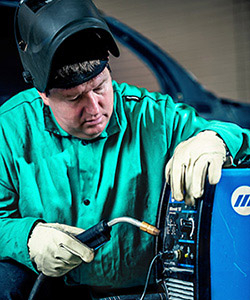For more than 16 years, Duane Mauldin sold operating room medical devices. But one day, he ended up in the operating room for a much more personal reason — fighting for his life after suffering three strokes in less than two hours.
The once vibrant medical vendor could no longer talk, and the entire right side of his body was paralyzed. Advanced care would be needed — and quickly — to offer him the best chance of survival.
“All I felt was despair and dread,” said Mauldin's wife, Rosie, who prayed for his survival. “I’m so grateful that the doctors and other caregivers at the hospital possessed the talent and tenacity to make the unachievable a reality for us,” she said.
“I’m so grateful that the doctors and other caregivers at the hospital possessed the talent and tenacity to make the unachievable a reality for us.”

The designation encompasses the full spectrum of stroke care — diagnosis, treatment, rehabilitation and education. It also highlights a facility’s ability to provide thrombectomy treatment, which helped save Mauldin's life.
“For some reason, Duane’s artery began to tear and unfortunately cut off blood flow to his brain,” said Benjamin Crandall, D.O., a neurointerventional radiologist on the Texas Health Dallas medical staff. Crandall used a catheter to navigate a device through an artery in Mauldin’s brain to grab and pull a clot from a blocked artery, restoring blood flow. Without the oxygen that blood flow brings, brain cells die.
“That’s why the phrase ‘time is brain’ rings so true in the world of neurology,” Crandall said. “The longer brain tissue is deprived of blood flow, the higher the chance of permanent brain damage.”
After a successful clot removal, Mauldin was moved to a nursing unit at Texas Health Dallas that specializes in patients recovering from neurotrauma. A dedicated team that included critical care, physical therapy, occupational therapy, speech therapy, psychiatry and physicians on the medical staff began to work with him.
Within three days, he surprised his wife by standing up on his own and dancing around in a circle while laughing. The care team was pleasantly surprised and continued to encourage his progress.
“I’ll never, ever forget the look on the nurses’ faces and PT staff as their jaws dropped in amazement!” Rosie Mauldin remembered. “Duane never stopped walking until the day we were discharged.”
Mauldin continues his recovery at home with his family. He is mobile — even driving again — and uses an automated communication device to speak. He enjoys taking college courses and pursuing his love of automobile restoration as a passion and potential profession.
The Mauldins have been on an emotional roller coaster, but they are grateful for the quality care received at Texas Health, Rosie Mauldin said, which provided their family a convenient network with easy access to advanced care.
“Duane’s overcome a great deal, and I can’t wait to see him accomplish so much more,” she said.
Call 9-1-1 immediately if you or a loved one is experiencing stroke symptoms. Call 214-241-4106 or find a physician on the Texas Health Dallas medical staff who can recommend a plan that may help you prevent a future stroke.

